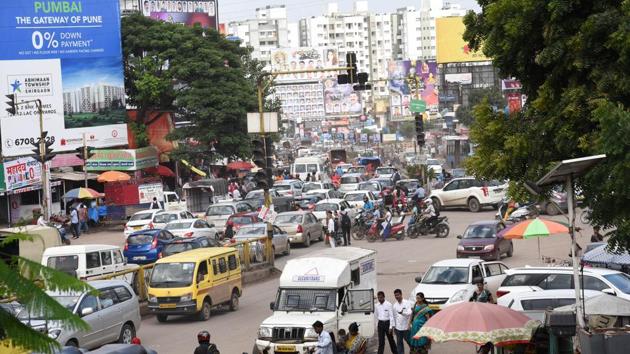Hinjawadi Traffic Woes Persist as ₹2,000 Crore Elevated Road Awaits Approval
Pune, often regarded as a burgeoning IT and educational hub, continues to grapple with severe traffic congestion, especially in the fast-growing Hinjawadi IT Park. One of the much-awaited solutions, the ₹2,000 crore Ravet-Narhe elevated road project, designed to ease the increasing traffic strain on the Mumbai-Bengaluru Highway, has faced an unfortunate roadblock. Despite the National Highways Authority of India (NHAI) submitting the detailed project report (DPR) for approval, the green light from the central government remains pending, causing a delay that threatens to stretch the city’s traffic woes for at least another year.
The elevated road, which spans 24 kilometres and will comprise six lanes, is intended to pass through key areas such as Wakad, Tathawade, Punawale, Ravet, Balewadi, Baner, Sus, and Bavdhan. It is expected to reduce congestion on the Mumbai-Bengaluru Highway, one of Pune’s busiest stretches. Additionally, with the project’s cost pegged at ₹2,000 crore and an additional ₹600 crore allocated for service roads, it represents a significant investment in Pune’s infrastructure. However, the project’s long-awaited progress is now stalled due to the delay in approval from the Finance Ministry committee.
This delay is not only frustrating for residents but is also a matter of concern for the numerous IT professionals working in Hinjawadi. During peak hours, the traffic bottleneck has become a daily struggle for commuters. The elevated road, once approved, would be executed in three phases: Ravet to Balewadi, Balewadi to Warje, and Warje to Narhe. NHAI officials are hopeful that once the central clearance is granted, the project will move swiftly to the tendering process, followed by construction work.
However, while the elevated road holds the promise of better traffic flow and reduced travel times, the delay points to a larger issue—Pune’s strained infrastructure. The city’s rapid urban growth has far outpaced the development of its transportation network, with residential, commercial, and industrial expansion creating a perfect storm of congestion. As projects such as this elevated road progress, it is crucial to incorporate sustainable development practices. The rising pollution and unsustainable commuting practices caused by traffic congestion pose a serious environmental challenge. A more sustainable approach to urban development would involve integrating eco-friendly transportation options like electric vehicles (EVs) and expanding green spaces along these major roads to mitigate the carbon footprint.
In light of the ongoing delays, it is important to reflect on how urban planning needs to adapt to the realities of rapid expansion. While the focus has traditionally been on improving road infrastructure, the emphasis should now also shift towards enhancing public transportation systems and encouraging multi-modal travel. Greater attention to sustainable urban development could help alleviate not just traffic woes but also the environmental impact of a rapidly urbanising city.
This delay in the elevated road project is just one example of the challenges faced by rapidly expanding cities in India. As Pune continues to grow, it will be essential for planners and policymakers to adopt a more holistic approach to urban development—one that balances infrastructure expansion with sustainability and long-term environmental health.




